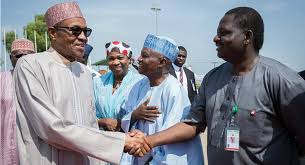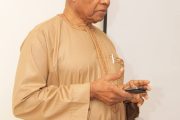Communicating Presidential Ill-Health in the Nigerian Context
“One of the great powers of the presidency, invested by the sanctity, history and rituals associated with the institution – the fact that the media take their primary discursive cues from the White House – is the power to describe, represent, interpret and appropriate.”
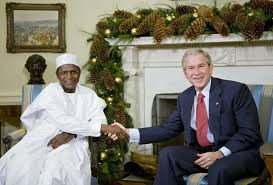
Late President Umaru Yar’Adua of Nigeria and former President George Walker Bush of the US as bricoleurs of their respective countries
Although crafted specifically in relation to the American presidency, the above quotation applies no less to the presidential power setting in Nigeria or any other country in the world, in so far as all the states in the international system are, in principle, equal. As such, the quotation captures the risk in the current role reversal in the communication of presidential ill-health in which the public has seized or has been allowed to seize from the presidency the power to describe, represent and interpret the president’s health. And the ‘coup’ has created room for the public to manufacture and attach to the president all manners of illnesses – from heart failure to cancer to kidney crisis. In the end, the twin risks of avoiding panic or nervousness on a national scale seems to be reinforced, or could be reinforced as rumours are becoming more pervasive and persistent.
It raises the challenge of how the bits and pieces about presidential ill health might have been communicated such that the public does not rely on the experiences of General Abacha and former president Umaru Yar’Adua’s in arriving at their own judgment about whether President Buhari’s health is poor, manageable or robust.
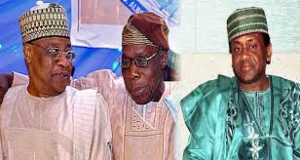
(L-R) IBB who maradonically sneaked out of the country to treat radiculopathy in a French hospital while in office, OBJ who was rumoured to have died 12 times as a sitting president, turning up each time to say he was in a ‘Kampe’ state while Abacha actually died in office
The Presidency is the institution with the bits and pieces about the situation. It has tried to communicate the bits in such a way that the functioning of the state and constitutional processes is not impaired by presidential absence. The gap which rumours and rumour mongers have risen to fill is the gap between presidential reticence in the management of the bits and pieces on the one hand and the emotionalism of the public on the other regarding the president’s health. It is a gap with its own risks in a country such as Nigeria, with best case and worst case scenarios which are open to interpretations from the point of view of winners and losers across Nigeria’s real and imaginary fault lines. But could the presidency have done better?
Handling this sort of situation can be problematic anywhere, anyways. And this is especially more so, if one recalls the President-Press Secretary dialogue which led Ronald Reagan, for example, to say that, in that case, even his underwear might also be publicised. As narrated by the White House Press Secretary in question, the president had wanted to go to the hospital, but quietly, out of the public glare. But his Press Secretary said it could not be done secretly. The President was not persuaded, wondering why he couldn’t just stroll into the hospital, receive attention and walk away. It cannot be done like that, because nobody can estimate the level of panic in Wall Street, should it leak, that the president of the United States of America is as indisposed as to have been to the hospital, said the Press Secretary. It was the victory of his logic that frustrated Reagan to suggest his powerlessness against the media to the point that he offered that his underwear might as well be publicised.
It is many years now. The Nigerian president and the Presidency have transcended this level this time by promptly informing the nation each time the president is headed for medical attention abroad since assuming office in 2015. It does this, complete with transfer of power to the Vice-President as stipulated in the national codebook underpinning the management of power. But it is most likely that the Reagan approach or the preference for a secret walk to the hospital would have applied if the hospital were in Abuja or somewhere in Kaduna where the doctors could carry their equipment to the president’s chosen hideout under the cover of the night and attend to the president quietly. Unfortunately, Nigeria hasn’t got hospitals sophisticated enough to handle presidents who became sick in power in recent years. Except Abacha, every of them have had to go outside the country, stretching from IBB to the incumbent.
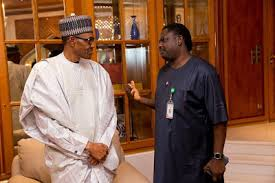
Access as power: President and Media Adviser
As about the only personal aide of presidents, prime ministers and heads of government who observe no boundaries, (because, among other reasons associated with mediatising power, he writes the rejoinder countering the malfeasance committed by other aides), the presidential adviser on media affairs is bound to be in the eye of the public over the management and mismanagement of situations such as this. S/he is automatically the one who carries the watering can. Could he have done better in this case? Would he have helped matters if he were there with the president in London? Would he have been more believable if he were seen to be shuttling between the sites of action in London, such as being seen in a photograph coming out of the hospital or interacting with some group at the Nigerian House and so on and so forth? Does his absence from the scene in any ways enhance the ‘hierarchy of credibility’ he enjoys as far as the communication of presidential matters?’ As one of the most believable sources in matters concerning the production of certain kinds of truth as far as the president is concerned, doesn’t this “absence” chip away at the bundle of veracity thus far presented to the Nigerian public?
It is difficult to answer any of these questions in terms of yes or no because, one, UK is another country, individuality counts, conception of the media adviser’s job by both the president and the adviser(s) could differ and so on and so forth. Professionally, though, there are expectations of what must be done in this sort of situation. Balancing it can be tough because the animal called man/human being can be complex. In some cases, the boss even does the job better than the adviser as when Reagan could still utter, “I forgot to duck!” in the midst of the assassin’s attempt on his life. It relaxed the mood and communicated to everyone that the president was alert enough to even crack jokes. Who knows, President Buhari might be cracking more of such jokes even now, that when echoed in the media could be more reassuring than whatever media statements are being issued.
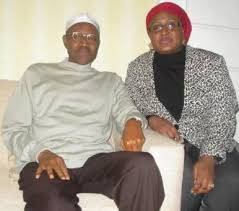
President and Mrs Buhari in a recent picture
One key problem with presidential power in governmentality is its irreplaceability. Worldwide, the presidency has been imagined in a way that the incumbent is his or her best reputation handler. His laughter, his jokes, his dress sense, his utterances, his wife and so on, weigh in much more than onerous attempts to represent it. Some presidents, governors, top political appointees and men of power might not be comfortable with it, but mediatising mannerisms has become a major part of a media adviser’s job in the age of real time information flow, making permanent proximity to the boss a key requirement of the job.
This is more so in this age in which the pervasiveness of the media has come along with the overturning of meaning production from the context solely of the speaker to the meaning making schema of the reader, viewer or listener. So, if Femi Adesina or Garba Shehu says, “the president is hale and hearty,” somebody tweets instantly: “hale and hearty president of Nigeria in London on vacation in a cold month like February?” Or Femi Adesina writes that the president is extending his stay indefinitely on doctor’s advice to complete his cycle of tests and someone somewhere tweets or flashes an email: would doctors in Europe give such an open ended advisory? The issue may not be who is absolutely correct, but readings of the message communicated are part of the negotiations over meanings and the power behind them, and may go on for some time. In other words, the media adviser or the modern practitioner of reputation management is up against a much more complicated job in the age in which the meaning of what he says does not reside with him but in what the audience makes of it or how they both negotiate the meaning. It is not that words had fixed meaning but they were assumed to. Now pragmatically, as in the case under review, events have shown to the contrary; and it is arguable if this facility is not deployed with greater ferocity when dealing with The Presidency in Nigeria and in other countries than any other realms.
That is not unconnected with the symbolism and holism of The Presidency or its equivalent almost everywhere. Again, in the American case, the president is constructed as “the chief bricoleur of American political life, a combination of story teller and tribal shaman.” This investiture of the American president with ethnographic qualities was written with reference to America’s primacy in global politics, and it applies substantially our Presidency in both domestic and international politics, which are no longer too clearly distinguishable anyway. The evidence is, President Buhari’s sickness is the news without which there is no news now in a country where a substantial number of the citizens, including former presidents, are always travelling outside the country for medical problems that might even be worse than the president’s. Therein is the challenge, of shaving close without cutting, of communicating President Buhari’s ill-health in a way that proves that Nigeria has matured beyond the olden days of Gen Abacha and former President Umaru Yar’Adua’s cases.
It is no use allowing the public steal the thunder of the real situation from the professionals paid to manage the president’s image because, as mentioned earlier in this piece, the notion that something much worse is happening to the president than has been admitted is capable of interpretation, reinterpretation and misinterpretation, all of which could have consequences in a country of ambitious power mongers and stability undermining power permutations.

